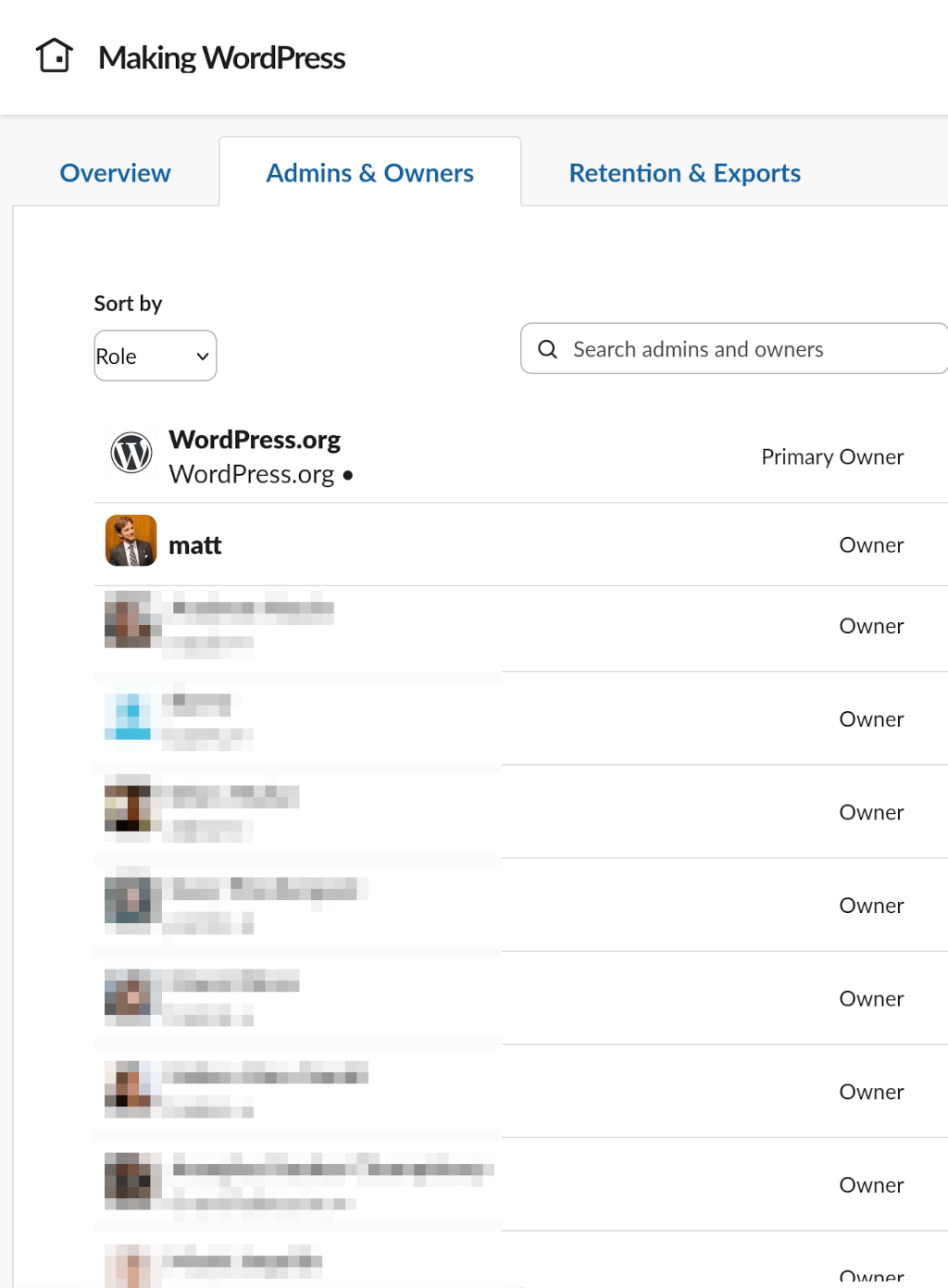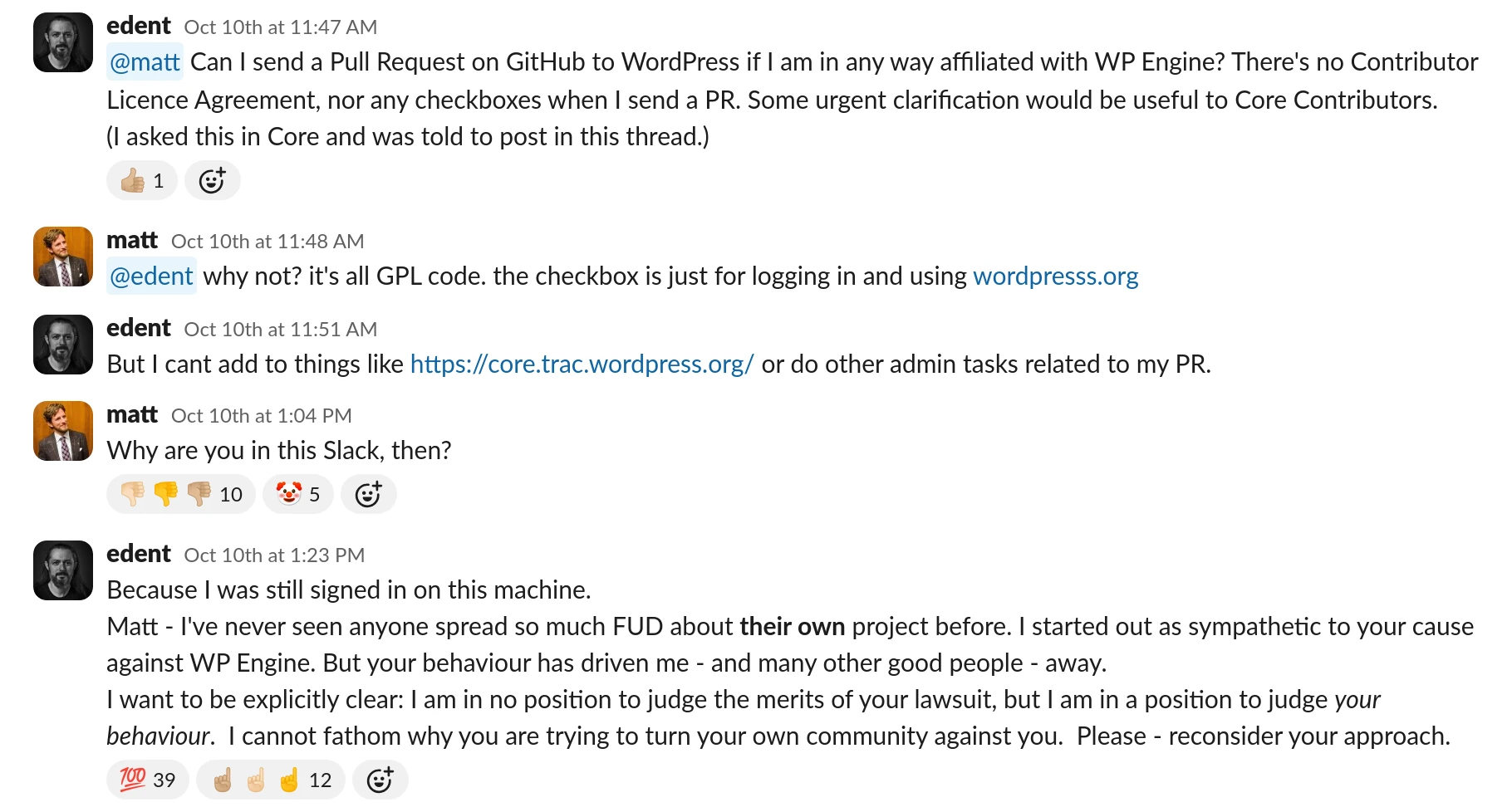A few weeks ago, I got a chance to speak truth to power. I used my WordPress.org account to sign in to the official WordPress.org Slack where the various WordPress dramas were being discussed.
After a brief chat about the latest shenanigans, I publicly replied to the CEO:
Here's a link to the full exchange
There was no reply forthcoming - although, as you can see, my message gathered a fair few positive reactions. As was inevitable, the next morning I found myself locked out of the Slack. I had been permabanned.
Then things got weird.
Someone claiming to be an employee of Automattic sent me a message saying that Matt had personally told people to ban me. I didn't know if they were telling the truth, but the GDPR gives me the right to see the data a company holds about me. That includes messages about me stored on their internal systems.
The WordPress.org Privacy Policy gave me an email address for their Data Protection Officer (DPO). So I sent a friendly(ish) message. After a little back-and-forth to clarify which data I wanted, I received this truly bizarre reply.
We are in receipt of your request, which you claim is justified by GDPR. Accordingly, we are processing your request pursuant to section 15(3) of GDPR, which requires us to provide personal information about the person that we are processing. You refer to messages sent about you on internal systems. To the extent those are outside the scope of GDPR, they are not covered by your request.
This betrays a fundamental misunderstanding of GDPR. There is not, as far as I know, an exemption for records held on internal systems. There are a list of GDPR exemptions - but they mostly relate to things like the detection of crime, academic and journalistic exemptions, health and social work data, etc.
Of course, there is an exemption for the purposes of self-incrimination. Perhaps that's what they're relying upon?
I replied with a (not so-friendly) email pointing out that I was entitled to a copy of any messages because they contain my personal data. I also pointed out that my request was neither manifestly unfounded nor manifestly excessive (another common get-out clause).
A week later, they replied:
I’ve followed up looking for any related records, and can confirm no records which use your likeness exist, other than the following:
edent was deactivated by <<REDACTEDUSER>>No records exist where this was discussed beforehand.
I take this to mean that either Matt personally swung the ban-hammer, without discussing it with anyone else, or that a flunky wanted to protect their master's ego and took unilateral action.
They only provided me with messages from Slack that I had sent. They didn't provide any of the messages that mentioned me.
I pushed for further clarification - but their answer baffled me:
The Slack instance you are asking about is a communication tool used by the WordPress volunteer community to coordinate on the project to build and maintain the open source WordPress software. There is no business or data controller that owns or manages this Slack. If one or more of the volunteers had a private discussion about you in this Slack you would need to direct your request to those individuals and they would need to decide themselves how to handle your request.
(Emphasis added.)
This, to me, implies that they are not following Slack's term's and conditions which explicitly say the owner of the Slack has to comply with data requests.
As between [Slack] and the customer, you agree that it is solely the customer’s responsibility to […] respond to and resolve any dispute with you and any authorised user relating to or based on customer data
Is this Slack really owned by volunteers? According to https://wordpress.slack.com/account/workspace-settings#admins - the primary owner is WordPress.org itself. Although there are several other users listed as owners, including Matt himself.

I specifically asked WordPress.org for details of their GDPR registration. Their reply is hilarious:
WordPress.org is privately owned by a person, not by a registered or covered entity.
While the email address says “Data Protection Officer” this is merely to make it easy for Europeans to find and contact the privacy volunteers who, of course, want to do their best to assist persons with privacy related questions and requests. This does not indicate that WordPress.org is a GDPR covered website or owned by any entity which is subject to the GDPR.
So now we're at an impasse. I have no way of knowing if the anonymous tip-off I received was genuine and I can't prove if WordPress are concealing messages to me. I think it is fair to say that other people feel that WordPress.org doesn't really understand the GDPR - so we can add this example to the list.
To sum up:
- WordPress.org is personally owned by Matt Mullenweg
- The website processes millions of users' data, yet has no GDPR policy.
- Volunteers are apparently cosplaying as Data Protection Officers, without any real knowledge of how GDPR works.
- An official WordPress.org Slack is run by WordPress.org with Matt & others as admins.
- This Slack processes the data of over 50,000 users without any GDPR compliance.
In my opinion, this is no way to run a major piece of web infrastructure. The community deserves better.

13 thoughts on “Is WordPress.org GDPR compliant?”
@blog what are the legal remedies in this case? How does GDPR enforcement work? It's weird how much I rely on companies to follow the law almost voluntarily, because enforcement is frankly beyond my wit.
| Reply to original comment on mastodon.social
Blimey
| Reply to original comment on bsky.app
Alex
That is an appalling state of affairs. I hate to jump to conclusions but it smacks of the stereotypical “techbros think they are above the law and just don’t care”.
The smallest charity which keeps personal data seems to know their responsibility under the GDPR. Wordpress certainly should.
Michael Donohoe
Not a lawyer, but I've implemented GDPR compliance frameworks and worked with the lawyers closely on a number of these subjects.
The WP DPO is correct. Messages like this are absolutely not covered by GDPR.
@edent
Firstly, there is no DPO. It is, apparently, a group mailbox for volunteers. None of whom have the role of DPO.
Secondly, I'm asking about how my PII is processed. I think that's covered, even if the processing is done by email.
Finally, when I've done DSARs before, companies have usually sent me emails between staff when they discussed me.
But, regardless of this specific incident, it reveals that WordPress.org has no meaningful GDPR compliance.
James Addison
How so?
@edent
Because, as I say in the post, wordpress.org sent me an email which literally says:
I don't know how else to interpret that statement.
🤡
Is Wordpress.org GDPR Compliant? | Hacker News
| Reply to original comment on news.ycombinator.com
I think the DPO of Wordpress.org needs to re-evaluate their knowledge & understanding of the UK GDPR and their response to you.
You could of course refer the matter to the UK ICO but too oft that is akin to using a chocolate teapot
| Reply to original comment on bsky.app
State of the Word 2024 Der Letter ist heute etwas später dran als sonst. Grund dafür ist, dass heute Vormittag Matt Mullenwegs traditionelle Rede State of the Word stattfand. Matt Mullenweg gab zum Einstieg einen kurzen Überblick über einige Download- und Nutzungszahlen. Außerdem gab er ein kurzes Update zum Data-Liberation-Projekt, das vor einem Jahr auf […]
| Reply to original comment on wpletter.de
@Edent I don't understand this statement from them "WordPress.org is privately owned by a person, not by a registered or covered entity." because that doesn't matter. Referreing to the ICO website ico.org.uk/for-organisations/u… I quote
Some things are not listed here as exemptions, although in practice they work a bit like an exemption. This is simply because they are not covered by the UK GDPR. Here are some examples:
"Domestic purposes – personal data processed in the course of a purely personal or household activity, with no connection to a professional or commercial activity, is outside the UK GDPR’s scope. This means that if you only use personal data for such things as writing to friends and family or taking pictures for your own enjoyment, you are not subject to the UK GDPR."
The data has to be "with no connection to a professional or commercial activity" to be outside the UK GDPR’s scope - Running a Open Source project would not be "personal or household activity"
A guide to the data protection exemptions
| Reply to original comment on friendica.ginestes.es
More comments on Mastodon.
Trackbacks and Pingbacks
[…] Terence Eden writes “Is WordPress.org GDPR compliant?” (Source: Terence Eden’s Blog) […]